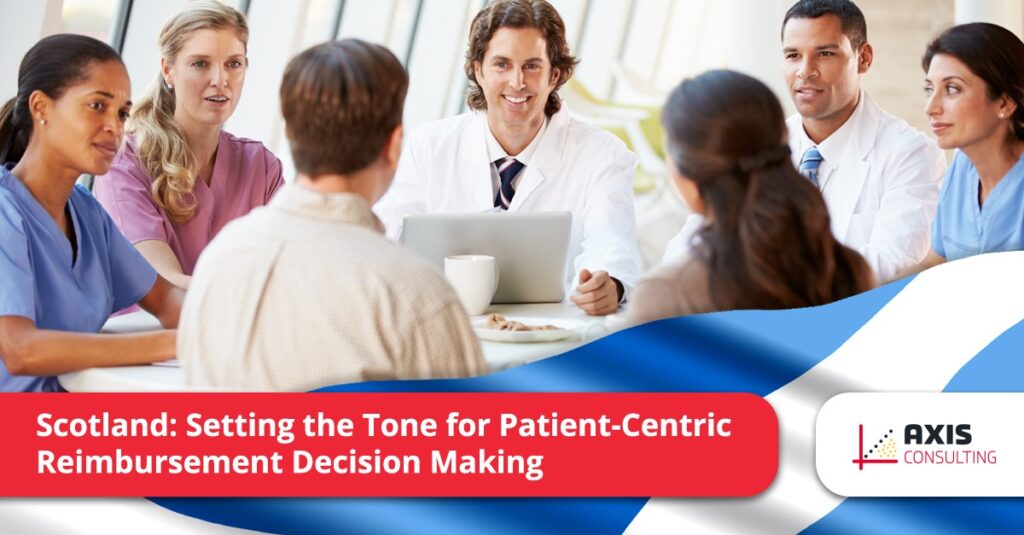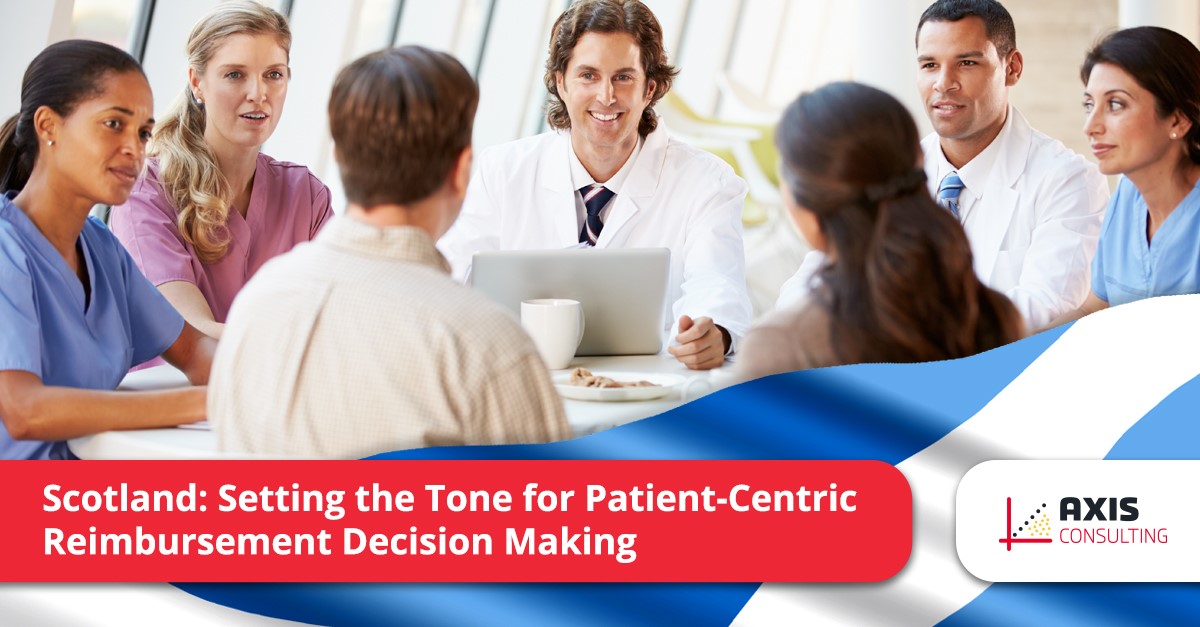Scotland: setting the tone for Patient-Centric Reimbursement Decision making

The effect Brexit is likely to have on medicine reimbursement timelines is prompting some market access experts to think more carefully about the strategy for future submissions. As I discussed in a previous blog, One Size Doesn’t Fit All, typically companies submit to the National Institute for Health and Care Excellence (NICE), followed by a submission to the Scottish Medicines Consortium (SMC), and then turn their attention to submitting to the National Centre for Pharmacoeconomics (NCPE) in Ireland.
But there is talk that this might need to change, with Ireland as a first port of call following an approval by the European Medicines Agency or indeed where a parallel submission to the NCPE and SMC would take place to help expedite the lengthy process faced in Ireland. With strong similarities between Scotland and Ireland including a population of approx. 5 million citizens in each nation, I believe it makes a lot of sense to develop and make submissions to SMC and NCPE in tandem which is feasible as both agencies encourage applications to be made upon the granting of a positive opinion by the CHMP.
Over the past few years, AXIS Consulting have spent more and more time working in the Scottish market and developing a deeper rapport with the health technology assessment authorities and the Scottish government to support our clients’ submissions. I have been deeply impressed by Scotland’s systems and processes for conducting value for money evaluations on new medicines and I think there are some potentially very valuable lessons for other HTA agencies, including Ireland’s National Centre for Pharmacoeconomics (NCPE) as well as England’s National Institute for Health and Care Excellence (NICE).
Transparency and flexibility
One stand-out feature of the SMC‘s approach is the commitment to transparency and information sharing throughout a company’s engagement with the agency. That starts with a clear layout of the timelines for a submission at the agency. Furthermore, each year the SMC hold an industry engagement event where the stakeholders have an opportunity to gain information and exchange perspectives on what they are party is trying to achieve.
At one such meeting back in September 2019, I remember sitting in a room in Glasgow with about 50 industry colleagues, listening to a range of speakers and being really impressed with the calibre of engagement, the degree of positive interaction and the genuine commitment to reaching agreement and understanding what all parties are trying to achieve. I realised we don’t get that same level of interaction currently in Ireland which is a pity as it is important that all parties understand each other’s intentions and purpose. That progressive, collegial approach is apparent at each and every touchpoint with the Scottish agency and a lot of agencies, could learn a great deal from the SMC about how to manage a submission by being more open and transparent in all communications.
Scotland is clearly keen to support early access to new medicines especially where the evidence base for a new drug is strong. The SMC encourages companies to proactively engage with its “horizon planning” process so that NHS Scotland boards can be made aware of new medicines coming to market, allowing effective budgetary preparation.
This approach goes back to the Review of Access to New Medicines, a report from an independent healthcare consultant, Dr Brian Montgomery that was published in 2016. The report challenged the Scottish Government and NHS Scotland to consider the processes in place to increase access to medicines, particularly for ultra-rare diseases. While companies must still demonstrate cost-effectiveness for new medicines and there is a broad recognition that “Scotland needs to have a system capable of saying no”, there is also a very deep understanding of the need for a more flexible process for assessing end-of-life, orphan and ultra-orphan medicines so that patients with rare diseases can have access to new treatments in a timely manner.
Patient Centric
In April 2019, the Scottish Government introduced a new ultra-orphan pathway, with the objective of improving access to orphan medicinal products whilst gathering real-world data to support the SMC’s reassessment and decision-making process. In 2020, the Scottish Board Chief Executives (BCEs) agreed to set up a risk-sharing arrangement to fund projects for ultra-orphan medicines approved via the new pathway, as well as for some medicines for extremely rare conditions accepted by the SMC beyond the new process. In so doing, the Scottish authorities have found a way to create a truly patient-centric process in a way that other countries have not yet achieved.
This patient-centric approach extends to all parts of the decision-making process for medicines for patients with rare diseases. Since 2014, the SMC has held patient and clinical engagement (PACE) meetings where patients are invited to contribute insights and experiences of the disease in a face-to-face forum and work with the authorities to ensure that decisions are based on true patient need, not just on the perspective of the economists. Indeed, as part of the review process, or period of evidence generation, Scotland’s authorities place huge emphasis on patient-centric outcomes and what they refer to as “the lived experience” of the patient. This is an approach that all authorities would do well to emulate, and one I would really like to see adopted more rigorously in Ireland.
In addition to the patient voice, expert opinion from Scottish clinicians is crucial in SMC processes. Companies seeking to make a reimbursement submission to the SMC must make sure they are reflecting the voices of the Scottish medical community both geographically and in terms of the specialty group that the medicine in question is targeting. This rigorous approach applied for the Scottish submission could benefit a parallel submission being done in Ireland where it may be possible to validate if the care pathway and management of a particular disease is the same done across the two nations.
As a consultancy firm working in both the Scottish and the Irish market, we have been hugely excited by Scotland’s progressive approach to medicines – whether it’s with the Edinburgh’s BioQuarter which is leading the way in biotech innovation, the SMC’s progressive PACE programme used in the Ultra Orphan pathway or their focus on ensuring transparency and timely decision making .There is much that other authorities, including Ireland’s NCPE, could learn from the SMC and in so doing create the opportunity for Ireland to take on a leadership role for reimbursement assessment and decision making in a post-Brexit world.
About the author
Brenda Dooley is the Chief Executive and founder of AXIS Consulting Ireland and Scotland, which provides personalised customer service to internationally based clients that are seeking to navigate the path to reimbursement for new medicines in both jurisdictions. Brenda has spent more than 21 years working in market access in pharmaceutical companies and consultancies and has expert knowledge of the Irish and UK healthcare systems. She and her team have successfully developed more than 77 high quality HTA submissions for NCPE and SMC.

